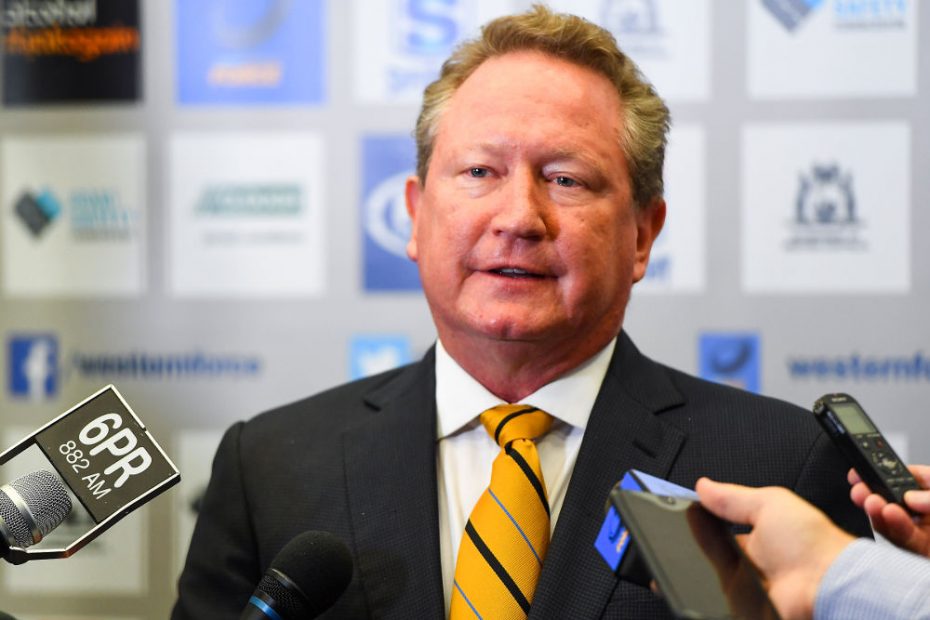It’s a question likely to draw a different answer form every table at a local rugby quiz night: What’s the single biggest problem for rugby in Australia right now ?
One of the myriad answers could be Andrew Forrest’s memory. Here’s why.
A week or so back, your correspondent revisited the August 2017 meeting between Twiggy and then ARU chairman Cameron Clyne, which might go down as a turning point in the history of Australian rugby.
What is now clear is that what happened in the immediate aftermath of that Adelaide meeting stands in the way of the hopes and prayers of grassroots supporters from the Dunsborough-Busselton Dungbeetles in Western Australia’s south-west to the Cairns Northern Beaches Mudcrabs in far north Queensland that Twiggy might lead Australian rugby out of the abyss.
A quick potted recap on that August 2017 meeting: In an eleventh-hour bid to save the Force from being axed from Super Rugby, Forrest flew on his private jet to Adelaide to meet Clyne (They agreed to meet at the half way line because neither was prepared to travel into to the other’s 22-metre zone). Forrest argued the Rebels should instead be culled because they were a financial basket case, having already bled the ARU of tens of millions of dollars in funding and loan write-offs. Either way, the last-on, first-off principle surely should apply, he told Clyne.
Then came what Twiggy thought would be the knock-out blow. He pledged to underwrite the Force’s financial future in Super Rugby, which meant he would personally cover any operating losses incurred by the Perth team so the ARU wouldn’t have to. To sweeten the deal, the former Hale School centre/winger (and occasional hooker when the bigger boarders went home) said that if the Force was spared the axe, he would also chip in tens of millions of dollars through the Australian Rugby Foundation into various levels of grassroots rugby around the nation.
To quote frontman David Byrne from legendary 80s rock bank Talking Heads, it was a Once in a Lifetime offer.
However, Clyne was already listening to a different tune. Despite Forrest’s largesse, the Force were axed and the loss-making Rebels lived to fight on, and make more losses, helped by CEO Andrew Cox cleverly exploiting a constitutional loophole to protect the team by selling the franchise to the Victorian Rugby Union for $1. Ultimately, as is now being played out, leaving Rugby Australia to mop up the mess.
(Photo by Daniel Carson/Getty Images)
That is all, of course, yesterday’s rain.
What is not as well understood and appreciated is that it is what happened immediately after Clyne’s snub which rankled the billionaire even more than the Force being axed. And, unfortunately for the Dungbeetles and Mudcrabs’ volunteers on junior canteen duty, it still does.
With the hearts of thousands of Sea of Blue fans out west still bleeding, the Rebels went straight to work picking over the Force’s carcass, snatching coach Dave Wessels and a dozen front-line players to shore up their own team. It had shades of the Melbourne Storm’s 1997 raid on the Western Reds’ roster when the Perth rugby league team got caught in the crosshairs of Rupert Murdoch’s Super League war.
The Force players cut and pasted straight into the Rebels included many players who had been developed into Super Rugby-ready status through the Perth club system. Players like Wallabies Richard Hardwick and Dane Haylett-Petty, Dane’s brother Ross and Neddies trio Anaru Rangi, Jermaine Ainsley and Michael Ruru. Others lured from the beaches of Trigg, Scarborough and Cottesloe to Bleak City included Wallabies Adam Coleman and Matt Philip.
Adding insult to injury, those Force players set the Rebels up for their best season in 2018.
All of which remains scorched into Twiggy’s memory bank.
“He (Clyne) screwed our state by shifting our entire Western Force team and coach to that hugely loss-making drain on Rugby Australia – Victoria – where he was from,” Forrest this week told your correspondent who, by way of disclosure, is a consultant to Fortescue Ltd, the ASX 100-listed company which last week delivered the Forrest family another $1 billion in dividends.
“Only for them to again go broke,” he added.
Inheriting a financial mess as well as a mis-firing national team, incoming Rugby Australia chief Phil Waugh reached out to Twiggy late last year to see whether there was any chance he might help dig rugby’s national body out of its black hole. However, your correspondent has confirmed those discussions are no longer live.
That is sad, but perhaps unsurprising given the events of August 2017. What is worth stressing though is that Twiggy kept his end of the bargain with Clyne.
Donning the batman suit, he not only leveraged the Force back into Super Rugby in Kerry Packer-style via his own Global Rapid Rugby set-up, but has also made sure the team’s bills were paid by their due date. That is lesson now being learned by one of the Rebels’ highest-profile new recruits who was negotiating to go west for season 2023.
All of which has meant that in the current swirl of media speculation that cash-strapped Rugby Australia might look to cull the number of domestic Super Rugby teams to just three in 2025, the Forrest-backed Force is looking bullet proof.
That’s a situation with echoes of a line from Once In a Lifetime where Byrne asks rhetorically: “You may ask yourself, “Well, how did I get here?”
Clyne and his ARU offsiders John Eales and Brett Robinson who were with him at the August 2017 meeting might be haunted by another couple of lines from the same Talking Heads song.
“Into the blue again, after the money’s gone
Once in a lifetime, water flowing underground
Same as it ever was, same as it ever was.”
Of course, Talking Heads is also remembered for the hit song Burning Down The House. But we won’t go there….
